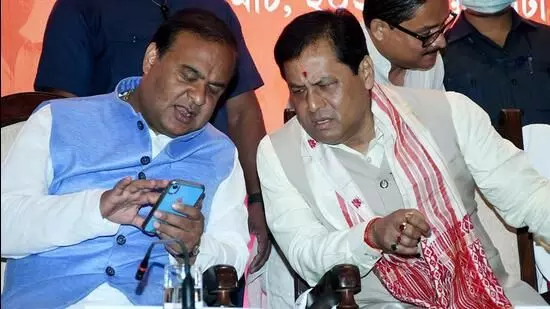The Protagonist and the Antagonist: HBS vs SS — A Study in Power and Hesitation

In Assam’s turbulent political theatre, few episodes have so clearly captured the balance of power and the contrast of personalities as yesterday’s media exchange between Himanta Biswa Sarma (HBS), the current Chief Minister, and Sarbananda Sonowal (SS), his predecessor and now Union Minister in Delhi.
When asked about Sonowal’s possible return to active state politics, their answers — brief but telling — laid bare the undercurrents of ambition, calculation, and survival that define today’s Assam BJP.
Himanta’s Directness: Confidence of a Protagonist
When the question was posed, Himanta replied, without hesitation, and with characteristic sharpness:
> “It’s up to him. Ask Sarbananda Sonowal.”
That simple sentence said everything.
Himanta did not hide behind platitudes, nor did he defer to Delhi, nor did he feign ignorance. Instead, he put the ball squarely in Sonowal’s court — signaling that any move to return would be Sonowal’s initiative, and he would have to own the consequences.
This was a subtle but clear assertion of dominance:
🔹 Himanta does not fear Sonowal’s return.
🔹 Himanta does not intend to facilitate or block it — because he already controls the field.
🔹 Himanta frames Sonowal as an outsider to Assam politics who now must prove himself worthy of re-entry.
For Himanta, the message is: “I am secure where I stand; if you wish to challenge or return, that’s your burden — not mine.”
Sonowal’s Mildness: Evasion of an Antagonist
Sonowal, true to his temperament, replied in his usual mild and deferential tone:
> “I will obey whatever order comes from Delhi.”
This response underscores why he has become the antagonist in this story — not because he is a villain, but because he is no longer the protagonist of Assam’s politics.
While his words convey loyalty to the party and discipline to the central leadership, they also expose his lack of initiative and political aggression — qualities that are crucial in Assam’s rough political arena.
By deferring to Delhi, Sonowal signals that he has no agency of his own, no clear plan, and no willingness to stake his claim without central blessings.
For Assam’s political observers, this meekness contrasts starkly with Himanta’s boldness — and reinforces the perception that Sonowal has already lost the decisive edge required to lead.
Strategic Context: Why These Answers Matter
For Himanta, this moment was another opportunity to demonstrate strength and magnanimity — not by attacking Sonowal, but by subtly reminding everyone who holds the reins in Assam. He already commands the government, the party machinery, and public narrative. His goal now is to keep the state stable, avoid unnecessary friction, and consolidate his dominance without appearing vindictive.
For Sonowal, the stakes are existential.
He is parked in Delhi as a Union Minister, out of the limelight in Assam, and at risk of political irrelevance. His name, once synonymous with the anti-IMDT Act movement and Assamese pride, is now fading. If he wishes to preserve his legacy and stay relevant, he needs to reclaim a role in Assam.
But his mild, evasive answer suggests he may not have the appetite for a fight — at least not yet.
The Symbolism of Their Approaches
Himanta’s reply — direct, confident, and challenging — signals ownership.
Sonowal’s reply — submissive, deferential, and hesitant — signals dependence.
This contrast is also consistent with their political journeys:
Himanta: From a brilliant student leader to a master strategist who engineered the BJP’s dominance in Assam and displaced Sonowal himself.
Sonowal: From a fiery activist against illegal immigration to a ceremonial CM who was outmaneuvered by Himanta and sent to Delhi.
Even in family matters, Himanta has projected discipline — his brother resigned his bureaucratic post the day Himanta became CM to avoid any whiff of nepotism.
